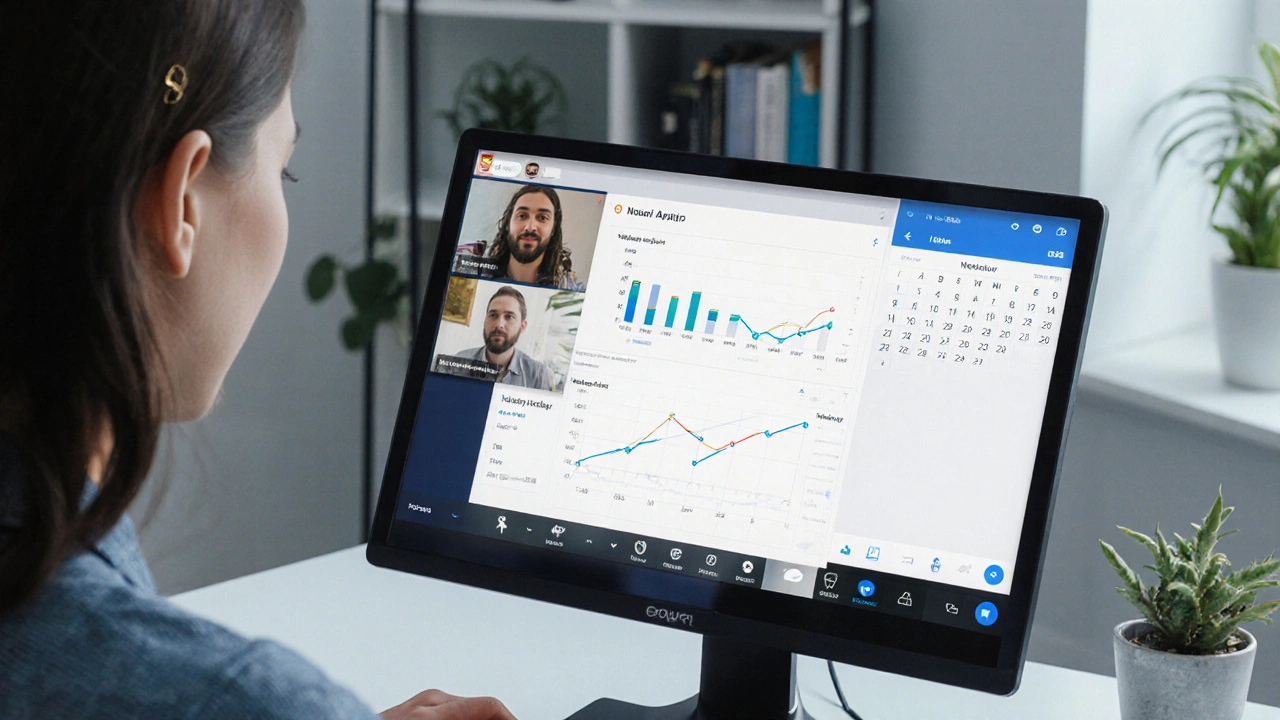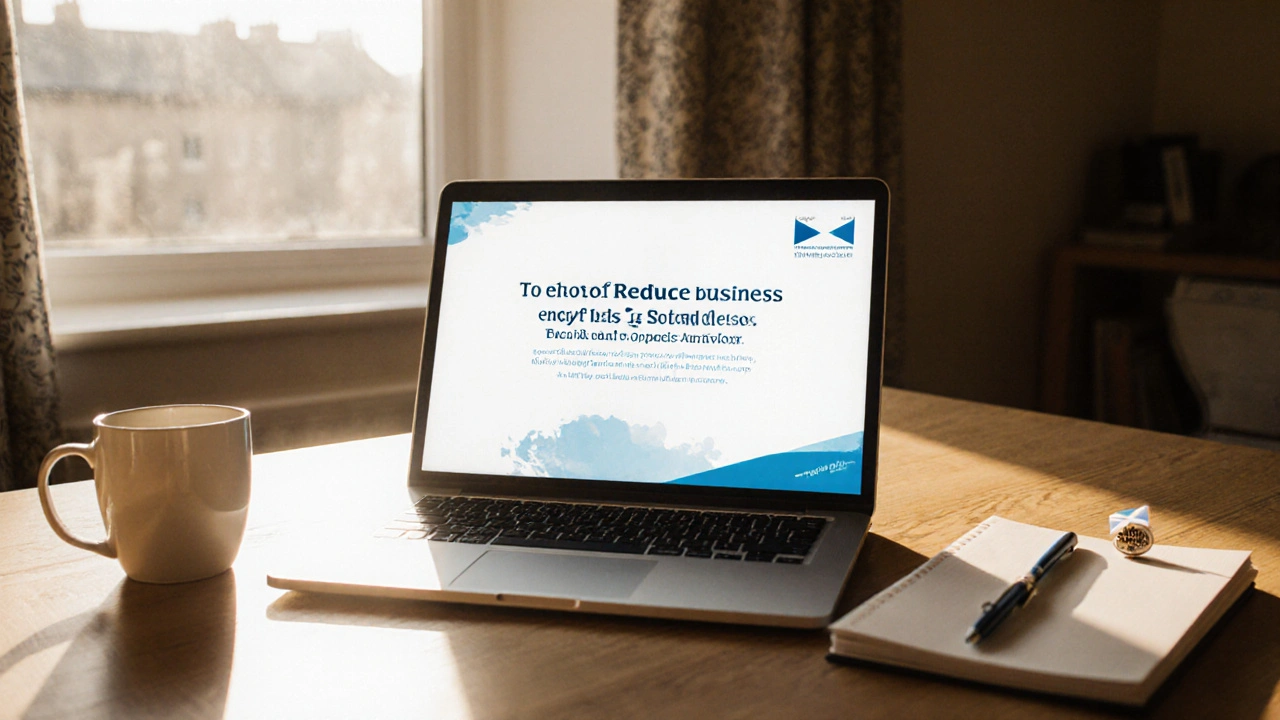Think about the last time you bought something online that didn’t ship in a box. Maybe you downloaded an eBook, signed up for a monthly coaching call, or used a website to book a virtual consultation. That’s a digital product or service-and they’re not just for tech companies anymore. Small businesses in Edinburgh, Glasgow, or even rural Scotland are using them to reach customers without renting office space or hiring a big team.
Digital products are things you can download or access instantly
A digital product is anything you can deliver electronically. No shipping. No inventory. No warehouse. Once it’s made, you can sell it over and over again. Think of it like a song on Spotify-you don’t own the physical CD, but you still get the music.
Examples include:
- E-books and guides (like a 30-page PDF on how to reduce business energy bills in Scotland)
- Printable templates (budget trackers, social media calendars, invoicing forms)
- Online courses (a 4-week video series on using free tools to manage your accounts)
- Stock photos, fonts, or design assets
- Mobile apps or browser extensions
- Membership sites with exclusive content
One bakery in Aberdeen started selling a downloadable sourdough starter guide for £12. Within three months, they made more from that one file than from selling 500 loaves. Why? Because once it was written, it sold 24/7 without them lifting a finger.
Digital services are actions you perform for someone online
If a digital product is something you *buy*, a digital service is something you *get done*. It’s work delivered remotely, usually on demand or on a schedule.
Examples include:
- Virtual assistant work (managing emails, scheduling meetings)
- Online tutoring or coaching
- Web design or copywriting
- Accounting services using cloud software like QuickBooks
- Remote social media management
- Video editing for YouTubers or small brands
- Consulting calls over Zoom
A freelance marketer in Dundee started offering a £75 monthly "Instagram Health Check"-a 30-minute call where she reviews a local business’s account and gives three actionable fixes. She didn’t need an office. She didn’t need to travel. She just needed a laptop and a Calendly link. Within six months, she had 18 regular clients.
Why digital offerings work better for small businesses
Traditional businesses often get stuck because they think they need a storefront, staff, or big budgets. Digital offerings flip that. You start small, test fast, and scale only when you know it works.
Here’s what makes them powerful:
- Low startup cost-You can launch a digital product for under £50 using tools like Gumroad or Etsy.
- No inventory-No risk of unsold stock rotting in a shed.
- Global reach-Someone in Canada can buy your guide while you’re sleeping in Edinburgh.
- Recurring income-Subscription services (like monthly coaching or software access) give you steady cash flow.
- Scalable-One course can teach 100 people at once. One email template can be sold 1,000 times.
Compare that to opening a café. You need rent, equipment, staff, licenses, insurance, and a constant flow of customers. A digital product? You can build it on a weekend and start selling it Monday.

Common myths about digital products and services
Many people think digital offerings are only for tech gurus or influencers. That’s not true.
Myth 1: You need to be an expert. You just need to know more than someone else does right now. If you’ve managed your own business finances for two years, you can create a simple budget template for others who are just starting.
Myth 2: It’s too competitive. The market isn’t saturated-it’s fragmented. There are thousands of small businesses in Scotland looking for help with social media, taxes, or customer retention. You don’t need to beat TikTok influencers. You just need to help one local bakery owner.
Myth 3: People won’t pay for digital stuff. In 2025, 78% of UK small business owners have bought a digital product or service in the past year (based on ONS and UK Business Federation data). They’re buying guides, templates, and coaching because it saves them time and money.
How to start with your first digital offering
You don’t need a website, an app, or a marketing team. Start with what you already know.
- Find your skill-What do people always ask you for help with? Maybe it’s organizing files, writing emails, or choosing the right software.
- Package it simply-Turn that help into a one-time download or a 30-minute call. Don’t overcomplicate it.
- Use free tools-Gumroad for selling downloads, Calendly for booking calls, Canva for designing simple PDFs, Google Drive for storing files.
- Test with 5 people-Offer it for free or half-price to friends, local Facebook groups, or Reddit communities. Get feedback.
- Price it right-Start at £10-£25 for products. £50-£100 for services. You can raise prices later.
A hairdresser in Inverness made a 12-minute video called "How to Style Your Hair Between Salon Visits" and sold it for £15. She posted it in two local Facebook groups. Sold 87 copies in two weeks. She didn’t even need to film it in her salon-just used her phone and a mirror.

What’s next? Build something that lasts
Digital products and services aren’t a side hustle. They’re a new way to run a business. The people who win aren’t the ones with the fanciest websites. They’re the ones who solve one small problem really well-and repeat it.
Think about your own skills. What do you do that others find useful? Turn that into something you can deliver online. Start small. Test it. Improve it. Then scale it.
You don’t need to be a tech expert. You just need to be willing to try.
Are digital products and services the same thing?
No. Digital products are things you buy and keep-like an eBook, template, or course. Digital services are actions someone does for you-like coaching, design work, or accounting. One is a thing. The other is a time-based task.
Can I sell digital products if I’m not tech-savvy?
Absolutely. You don’t need to code or build apps. Use simple platforms like Gumroad, Etsy, or Payhip to sell PDFs, videos, or audio files. Tools like Canva let you design covers and layouts without design skills. Most digital products are just well-organized information delivered in a file.
Do I need a website to sell digital services?
Not at all. You can use Calendly to book calls, PayPal or Stripe to get paid, and Google Drive to send files. Many service providers use just their LinkedIn profile or Instagram bio to attract clients. A website helps later-but it’s not a requirement to start.
How do I price my digital product or service?
Start by asking: "What’s the value to the buyer?" If your guide saves someone 5 hours of research, £20 is fair. For services, charge based on time and outcome. A £75 monthly check-up that saves a business £500 in wasted ads is a no-brainer. Test prices with a few early customers-don’t guess.
What’s the easiest digital product to start with?
A simple checklist or template. If you’ve ever made a to-do list for your own business, turn it into a downloadable PDF. Examples: "5-Step Tax Prep for Freelancers," "Monthly Social Media Planner," or "Questions to Ask Before Hiring a Web Designer." These take an hour to make and sell for £5-£15. Low effort, high return.
Common mistakes to avoid
Even simple digital offerings can fail if you skip the basics.
- Overcomplicating the product-Don’t make a 100-page course when a 10-page PDF solves the problem.
- Ignoring feedback-If three people say your guide is confusing, fix it. Don’t assume you know better.
- Not protecting your files-Use password protection or watermarks if you’re selling PDFs. Don’t just email a link anyone can share.
- Waiting for perfection-Your first version doesn’t need to be flawless. Launch it, learn, improve.
- Forgetting payment setup-Make sure you can actually get paid. Use Stripe, PayPal, or GoCardless. Don’t rely on bank transfers.
The biggest mistake? Not starting at all. The market isn’t waiting for perfect. It’s waiting for someone who’s willing to try.



Comments (12)
Michael Gradwell November 16 2025
Digital products are for people who can't handle real work. If you're selling a PDF instead of building something tangible you're just procrastinating with a PayPal button.
Flannery Smail November 17 2025
Wait so you're telling me a hairdresser in Inverness made more from a 12-minute video than from cutting hair? That's either genius or the entire economy is broken. I'm not sure which is worse.
Emmanuel Sadi November 17 2025
Of course it works. Everyone in Scotland is broke and will pay £15 to avoid thinking about their own finances. This isn't entrepreneurship it's digital welfare for the lazy.
Nicholas Carpenter November 18 2025
I love how this breaks it down so simply. I started selling a checklist for organizing freelance invoices last month and made £200 in two weeks. No website. Just a Canva template and a Gumroad link. It feels good to turn knowledge into something that actually helps people.
Chuck Doland November 19 2025
The conceptual distinction between digital products and digital services is not merely semantic-it is ontological. A product is an objectified artifact of labor; a service is the temporal enactment of expertise. The former possesses fungibility, the latter exclusivity. This framework illuminates the structural asymmetry in value creation within the gig economy.
Madeline VanHorn November 21 2025
Anyone who thinks a PDF is a business hasn't run a real company. This is for people who think 'side hustle' is a career.
Glenn Celaya November 21 2025
78% of UK small biz owners bought digital stuff? Yeah right. That stat was made up by some guy in a hoodie selling Notion templates. Also why does everyone use Gumroad? Isn't that just a glorified Dropbox?
Wilda Mcgee November 23 2025
OMG YES. I turned my chaotic spreadsheet for tracking client deadlines into a printable planner and sold 140 copies on Etsy. People are starving for simple fixes. You don’t need to be an expert-just someone who’s been there. And yes, Canva is magic. I cried when I made my first template. 💕
Chris Atkins November 24 2025
My cousin in Glasgow sold a PDF on fixing leaky taps and now he's got a whole little empire. No cap. Just a phone a printer and some common sense. The internet's wild like that
Jen Becker November 24 2025
Why do people think this is revolutionary? It's just capitalism with less sweat.
Ryan Toporowski November 25 2025
You got this!! 🚀 I started with a £5 Canva template for meal planning and now I have 3 passive income streams. The key? Just launch. Don't wait for perfect. I messed up my first design so bad it looked like a toddler drew it 😅 but someone still bought it. You don't need to be fancy-you just need to be helpful.
Samuel Bennett November 25 2025
Did you know Gumroad has been flagged by the FTC for not disclosing affiliate links? And Etsy’s algorithm buries digital products unless you pay for ads. This whole thing is a pyramid scheme disguised as empowerment. Also your PDFs are probably copyrighted by Adobe. You’re all getting sued.